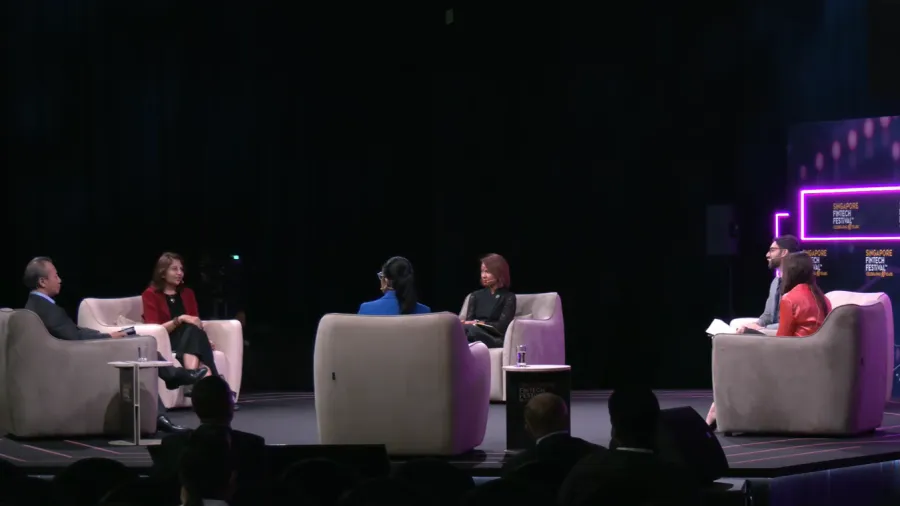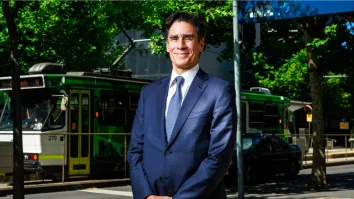
‘Trust’ will anchor AI-driven global trade networks—financial experts
However, building trust continues to be a constant challenge for the industry.
Despite the surge of innovation in global trade payments, panellists warned that it all collapses without trust anchoring the system, they said during the Rewiring Global Value Chains: The AI and Payments Dual-Engine panel at the Singapore Fintech Festival 2025 in Singapore on 13 November.
Livia Benisty, chief external affairs officer at Banking Circle, said that even as money begins to move across a growing mix of interoperable payment rails, the real imperative is to keep those flows within safe, trusted and regulated networks.
She said the word ‘trust’ has been mentioned several times during several panels at the Singapore Fintech Festival 2025, more so than the word ‘agentic’, emphasising its importance in the financial space.
“You’re moving huge amounts of money around, so you have to have trust in the payment flow. You also need to have trust in the AI, the explainability. That’s where the policy issues will come in. You got the policy and the regulated entities. And if you can be the entity that brings together innovation, trust, and compliance, then that’s where you’ll be at the core of the system. That’s what we are working on,” Benisty said.
Amira Karim, head of public policy, payments & financial services at Amazon, agreed that trust is the heart of everything, but one element she wants to connect to trust is how data can be used to augment and improve that trust.
Karim said regulators and policymakers are often the ones carrying the responsibility of building trust across global trade networks
“But can we utilise data, can we utilise new technologies to make trust a bit more decentralised? And I don’t mean just through DLTs (Distributed Ledger Technology), but that access and agency agencies for someone or an SME or an individual to understand what is going on on the underlying infrastructure is really powerful,” Karim said.
Anju Patwardhan, a former banking executive and now an independent board director at Gulf International Bank, said building trust will be hard if banks aren’t willing to share information and oftentimes cannot agree on which technology to use or how to move forward.
“You almost [always] need an independent third party to build that trust to be able to collaborate and share information,” Patwardhan.
Patwardhan said she has long questioned why the corporate world lacks an equivalent of a consumer credit bureau, noting that without a neutral, independent mechanism to share information, trade finance and corporate lending struggle to build the trust needed to progress.
Kazuya Ikeda, senior managing executive officer, head of transaction business and AI transformation, and deputy head of global business unit at Sumitomo Mitsui Banking Corporation, agreed with everyone in trade finance that building their own separate system, especially systems that can’t talk to each other, is one of the biggest barriers in building trust.
“For example, blockchains. We have many blockchains, but these blockchains cannot talk to each other. But if we can do that in a secure and trusted way, that’s one solution,” Ikeda said.
Ikeda suggested building a global, trusted common network similar to SWIFT but designed for blockchains. He also suggested using tokenisation to protect privacy, allowing sensitive data to be shared and processed by AI without exposing identities.
Adding on Ikeda’s point, Benisty noted that the interoperability he described is no longer theoretical, pointing to JPMorgan’s recent move allowing value to flow from its permissioned blockchain to a public chain where JPM Coin can be exchanged for USDC. She argued that this kind of secure cross-chain connectivity shows the technology is ready, and that the real barriers now lie in policy, regulation and banks’ confidence in using it.
Namrata Jolly, Managing Director, Head of FSI Asia at Microsoft, shifted the focus to the intelligence that will operate on top of those systems. She stressed that even if blockchain connectivity is nearly solved, the wider ecosystem will not progress unless AI itself is trustworthy.
Speaking from Microsoft’s vantage point, she underscored the need for Responsible AI frameworks that safeguard fairness, reliability, inclusiveness and transparency across financial applications.
“With no trust, there is no adoption,” Jolly said, noting that AI-powered decisions, whether in loan origination or risk assessment, must be explainable and bias-free if regulators and customers are to rely on them.
Giving their thoughts on the future of finance, Karim said there is a need to move beyond connectivity as it is ‘table stakes’
“I think the future of finance is really about coherence. I think that we make we have to make sure that technology has a mechanism for working together and that we develop shared aligned goals, as well as shared language to ensure that there is alignment, so moving from connectivity to coherence through collaboration,” Karim said.
Patwardhan said the only item on her wishlist for the next five to 10 years is to have a global or national central body that can coordinate responses to cyber and ransomware attacks, so companies, especially SMEs, aren’t left to handle crises alone.
Patwardhan cited when Japanese beer maker Asahi suffered a cyberattack that disrupted its operations in October, forcing it to shut down most of its factories.
“I was thinking, why is every company left to deal with this situation on their own? I think last month Singapore announced a legal framework or a central hotline their setting up for SMEs, so when they have a cyberattack, [they can get support],” Patwardhan said.
Ikeda closed by stressing both the scale and the responsibility of AI’s role in modern trade.
“There are unlimited ways to utilise AI,” he said, noting that the challenge now is to deploy it responsibly, which is why he has centralised all financial, insurance and AI functions under one team.
For Jolly, she sees a huge opportunity for public-private partnerships. “There has been the ability for public and private players to leverage advancement in technology that a certain set of players are putting in place, while the others can adopt, and also the ability to put in consistent standards to make these problems that we’re talking about much easier to deal with,” she said.
Meanwhile, Benisty says she sees payments ultimately becoming invisible. This means that everything is fully on-chain, fully interoperable, and frictionless.
“It shouldn’t matter to my clients or my end clients whether they’re using stablecoin or tokenised deposits, or fiat. They shouldn’t even know. Payments are just the nervous system. They just underlie it. The interesting thing is the data, the intelligence, and what you can do with it,” Benisty said.

















 Advertise
Advertise











